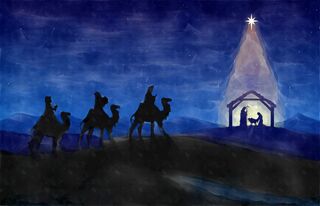Empathy
Jesus, The Three Wise Men, and Universal Human Transmissions
Finding common humanity in one of our oldest tales.
Posted December 30, 2021 Reviewed by Kaja Perina

As the legend and Gospel of Matthew have it, sometime soon after baby Jesus was born in Bethlehem, three wise men of the East came bearing gifts. They brought gold (to recognize him as a king), frankincense (to honor his role as a teacher, priest or the “son of god,” as some have it) and myrrh (to anoint him in suffering and death).
As I write in an essay at East Wind: “I interpret the gifts of the Magi as the gifts of common humanity. Gold, for the wonder and possibility of being born a sentient being. Frankincense, to honor all the ways we might serve and help each other. And myrrh, because we all suffer and die." We all get these and other “gifts” of common humanity in the world. The common humanity of suffering, in particular, comes to us in what I call “universal human transmissions,” gifted to us from our own experience and our empathy for others. They are cries from our ancestors and from all the humans who live with us and have gone before. Naming these cries and transmissions helps us in at least three ways. First, research has shown that naming our emotions actually deactivates the amygdala and reduces suffering. Secondly, recognizing that our distress resonates with other human beings throughout history helps us feel less alone, and this also relieves our burden. Finally, recognizing our commonality with others helps us to develop empathy, compassion and insight, bringing us closer to belonging – which is the opposite of suffering.
Here are some of the UHT’s I’ve received, as a human and psychiatrist.
I feel alone.
I am in pain.
Someone hurt me.
I wish that didn’t happen.
I am unloved.
I feel shelved, discarded, devalued.
I feel left out.
I feel left behind.
I am unlovable.
I am not good enough.
I’m worthless.
I’m ashamed of myself.
Won’t someone cut me a break?
Won’t someone save me?
I didn’t get enough love and support in life.
No one understands me.
Does anyone hear me?
Does anyone see me?
Who has my back?
I am bereft.
I need someone who’s not here.
I need something which is not available.
I do not like what is on my plate.
I have been abandoned.
They’ve got it in for me.
I am lost.
I am confused.
I am afraid.
I am worried.
I have been betrayed.
Sometimes I’ve imagined these are distress calls being beamed to us from a distant world. Alternately, our mind/hearts are a “historiscope” channeling historical anguish into our present moment. If we’re lucky, we also perceive the UHT’s that would transform suffering into enlightenment.
Have you received and transmitted these? Have you heard other UHT’s? They all come in specific ways to us as individuals, but they are also part of our human inheritance. Jesus translated and transformed the UHT’s he received. Can we?
When we name our UHT’s, we can truly recognize that we are all in this together. We all look for light, hope, and relief from suffering. We can be that, for each other and for ourselves.
(c) 2021 Ravi Chandra, M.D., D.F.A.P.A.
References
Chandra R. MOSF 16.10: Assassin. Abattoir. Academia. America. The Poetry of Truong Tran and Terrance Hayes. East Wind eZine, December 30, 2021


